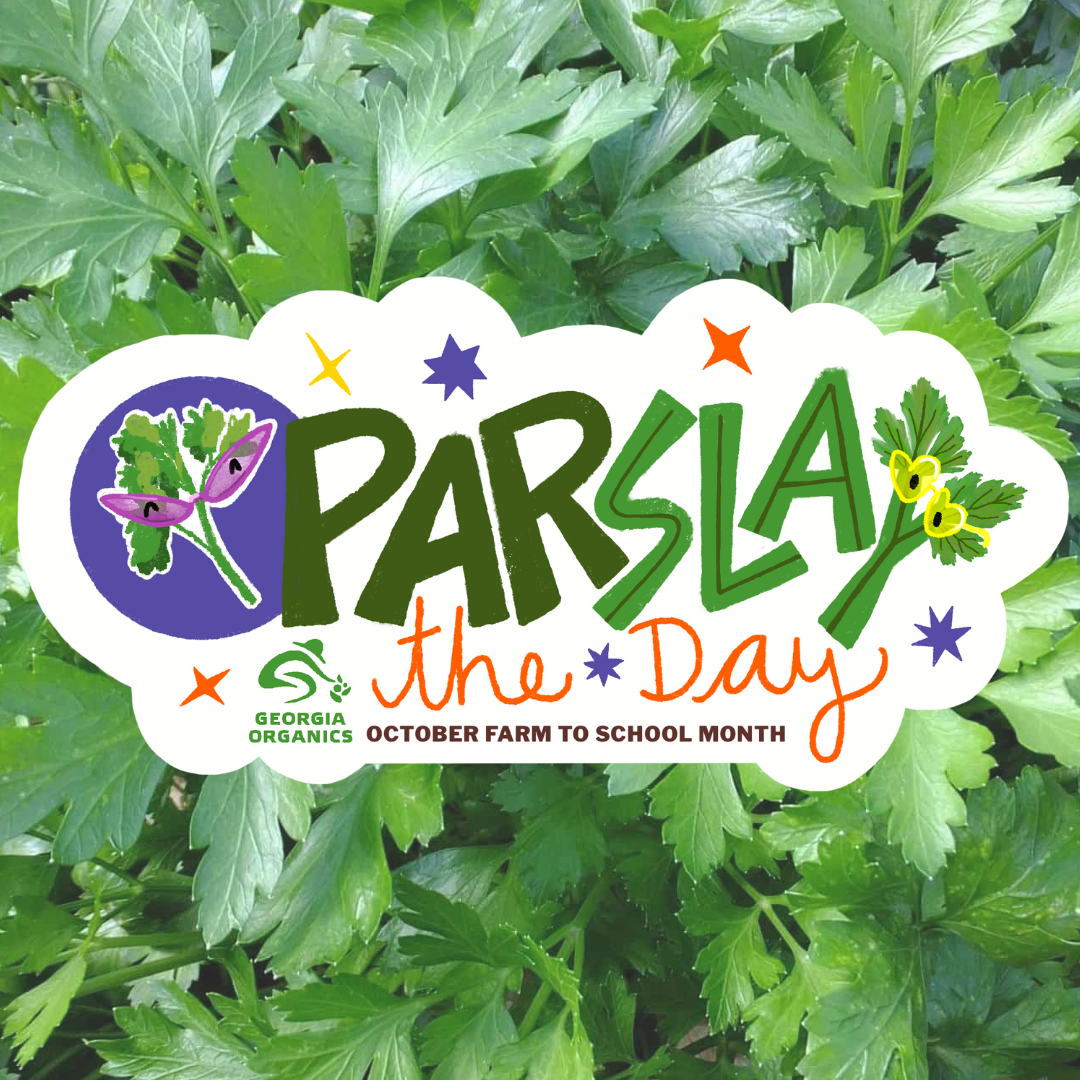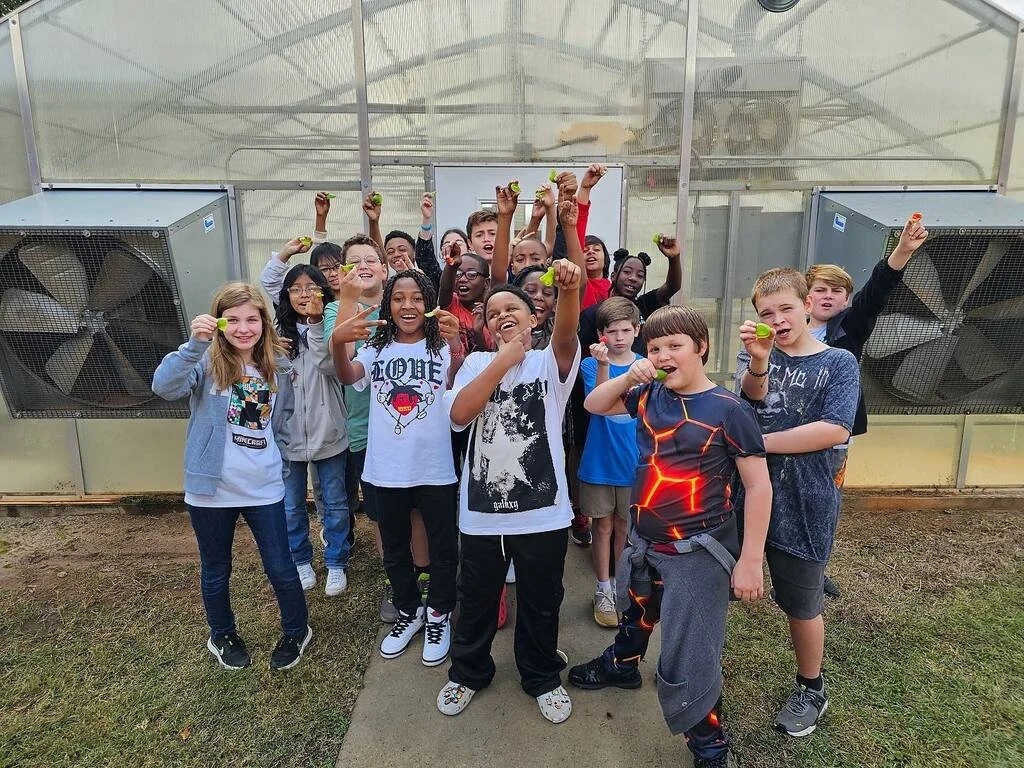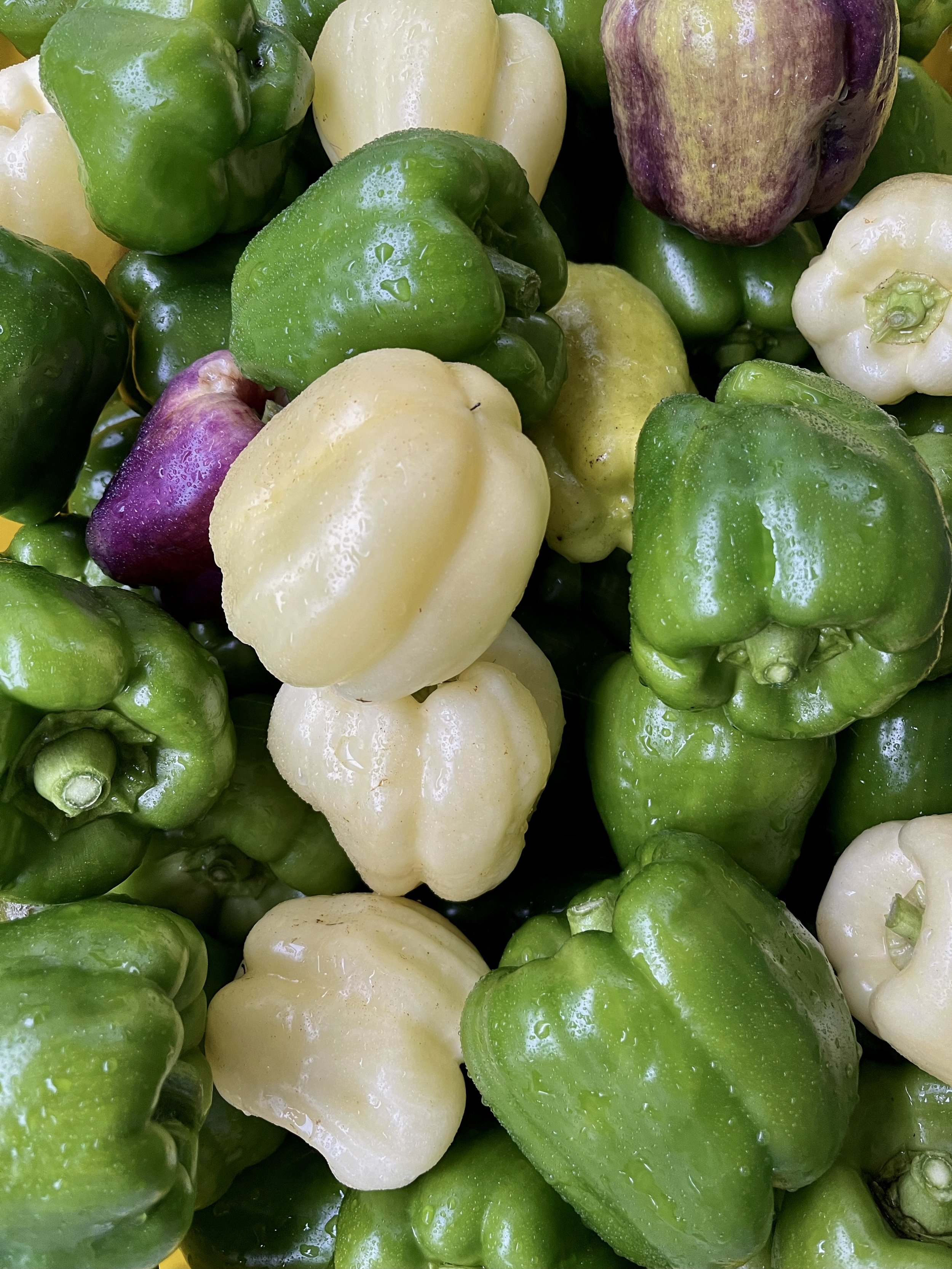By Kimberly Della Donna
Kimberly Della Donna is the Director of Community Collaborations at Georgia Organics.
This October, Georgia Organics is proud to celebrate the 12th annual Farm to School and Farm to Early Care and Education (ECE) Month with our sweetest theme yet: Apple of Our Eye.
Since 2013, Georgia Organics’ October Farm to School Month has brought hundreds of thousands of Georgia students, educators, school nutrition professionals, farmers, and families together to celebrate fresh, local food in cafeterias, classrooms, and gardens. With fun resources, engaging contests, and a focus on hands-on learning, this statewide campaign connects communities to where their food comes from, and encourages lifelong healthy habits.
The Roots: Where It All Began
The campaign was first launched in 2013 by the visionary Godmother of Georgia Farm to School, Erin Croom. With Lettuce Try It, Erin planted the seeds of what would become one of Georgia Organics’ most beloved annual traditions. Twelve years later, we’re still growing thanks to creative themes, delicious produce, and a passionate community of partners, participants, and supporters making it all possible.
From the beginning, Farm to School Month has reflected Georgia Organics’ mission: to invest in organic farmers for the health of our communities and the land. By connecting children with local food and those who grow it, the campaign uplifts farmers while nurturing healthier, more resilient communities across Georgia.
A Look Back
2013: Lettuce Try It
2014: Grow Radish Grow
2015: Rooting for Carrots
2016: Leaf it to Spinach
2017: Make Room for Legumes
2018: Kickin’ It With Kale - Inspired by a partnership with Atlanta United, this campaign brought sporty spirit and kale’s powerhouse nutrition into schools across Georgia.
2019: Oh My Squash – A playful campaign featuring mischievous zucchini, this one filled classrooms and cafeterias with squashy, googley-eyed joy.
2020: Turnip the Volume - This music-inspired campaign helped schools stay engaged (virtually and safely) with farm to school despite the challenges of the pandemic.
2021: Livin’ La Vida Okra - A fan favorite that celebrated a Southern staple and brought humor and heart to Farm to School Month.
2022: Spinach to Win It – Yaza Sarieh kicked off her leadership with a celebration of leafy green strength. Check out this celebratory video to get a taste of the goodness.
2023: Pepper Palooza - A colorful, spicy pepper party, paying tribute to peppers of all shapes and heat levels.
2024: ParSLAY the Day - An herb-forward campaign that sprinkled fun into classrooms and cafeterias statewide. Check out this video to see how GA parSLAYED.
Team Member Reflections
In the spirit of nostalgia and joy, our team is sharing a few of our favorite memories from campaigns past:
Kimberly Della Donna: Launching my first Farm to School Month campaign “Make Room For Legumes” in my first year on the job was unforgettable. We filmed a silly launch video at Cosmos Farm, a Georgia Organics member farm where our very own Farm to School Manager, Kimberly Koogler, lives and works. I was with my amazing new team, crowded in the brightest greenhouse; so bright I could barely keep my eyes open, which made it look like I maybe love beans and the camera a little too much. The video? Let’s just say the sparkle board and cut-out legume photos were... charmingly DIY. But what we lacked in polish, we made up for in heart, craftiness and creative puns. Watch it here. The whole campaign left plenty of room for being goofy.
Yaza Sarieh: Pepper Palooza was hands-down my favorite campaign -- and it seemed to be a hit with everyone else too, as it was our biggest October Farm to School Month audience, reaching over 1,026,000 people. The campaign was such a fun, flavorful celebration of this spicy fruit, and I loved learning how peppers show up in cuisines and cultures around the world. More than anything, it brought people together in joyful and unexpected ways and served as a reminder that we're all pepper together.
Check out this video that showcases how Pepper Palooza brought excitement, learning, and local flavor to schools
Kimberly Koogler: Each campaign has been so joyful and rewarding in unique ways, but I might be most proud of shining the spotlight on and giving well-deserved glory to okra during Livin’ la Vida Okra in 2021. It felt like a statewide bonding experience during a time of social distancing to honor the history of okra and to highlight the diverse ways that folks around the state relate to and enjoy this sometimes underappreciated, yet incredibly beautiful, resilient, nutritious and delicious plant that thrives in our southern climate. Also, it’s hard not to be proud seeing photos of kids across Georgia growing and harvesting and trying okra for perhaps the first time.
Check out this video playlist that features favorite okra recipes and the stories behind them.
Photo courtesy of Jenna Mobley: Kids taste tested locally grown, raw and pickled okra at the East Atlanta Village Farmers Market in October 2021.
2025: Apple of Our Eye
This October marks our final Farm to School Month campaign, and we’re doing things a little differently. Instead of our usual rollout with sign-ups, contests, and coordinated outreach, we’re making all Apple of Our Eye resources available for free and easy access here. As Georgia Organics permanently pauses our Farm to School and Farm to ECE programmatic work, we invite you to carry the celebration forward in your own way. While we won’t be sending engagement emails or running contests, we’ll still be cheering you on from afar. So please keep sharing your photos, lessons, and local apple fun on social media using #appleofoureye
A Note of Gratitude
Over the past 12 years, each Farm to School Month campaign has been its own rich harvest- rooted in care, creativity, and connection. Together, they’ve grown into something much bigger than any one veggie, school, or celebration. These campaigns, crafted with love, served with joy, and shared by thousands, have been a gift to work on and to share. And at the heart of it all has always been you, the incredible community of educators, farmers, food service workers, caregivers, and kids who brought it to life. You are the true apple of our eye.
Together, we’ve transformed taste tests into triumphs, gardens into classrooms, and lunchtime into learning. You’ve shown us what’s possible when a community grows something together; not just food, but relationships, resilience, and wonder.
As we mark the end of this chapter, we do so with deep gratitude and pride in our work. To every teacher who turned a snack into a lesson, every school nutrition professional who sourced locally, every farmer who welcomed little hands into the field, and every child who took that first curious bite- thank you. You made this work matter.
The official campaigns may be ending, but the spirit of Farm to School Month lives on in every seed planted, every local bite served, and every child who now knows where their food comes from. The impact, relationships, and joy we’ve cultivated together will continue to grow in classrooms, gardens, and communities across Georgia.
Because once you plant the seeds of connection, they keep on growing.
Resources
The Apple of Our Eye resources are now available online--free and accessible to anyone! This ap-peel-ing toolkit is packed with FREE apple-themed lesson plans, activities, cafeteria recipes, and more. From the classroom to the cafeteria, we’ve got everything you need to celebrate apples to the core.
Don’t leaf this opportunity behind--be sure to take advantage of these fapple-ulous resources found in our Farm to School Lessons Library here for your upcoming appley celebrations.
Toolkits:
To learn more about Georgia Organics, visit georgiaorganics.org or follow us on Facebook, Instagram, LinkedIn, and YouTube.







































































